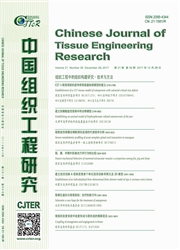

 中文摘要:
中文摘要:
背景:既往研究表明抵抗素可刺激软骨细胞产生大量趋化因子,在炎症性关节病变中具重要作用,但具体作用机制未明。目的:进一步探讨抵抗素刺激软骨细胞趋化因子CCL3及CCL4基因表达上调的机制。方法:培养人源性软骨细胞,T/C-28a2细胞及ATDC5细胞,采用q PCR检测抵抗素刺激趋化因子基因的作用,C/EBPβ表达,核因子κB亚型及软骨特异性mi RNAs。给予核因子κB抑制剂(IKK-NBD)和C/EBPβ抑制剂(SB303580),对C/EBPβ及核因子κB的共同调节作用进行检测。在给予抵抗素刺激或无抵抗素刺激时分别进行亚细胞结构定位检测。结果与结论:①抵抗素可非依赖性上调趋化因子基因表达。②软骨细胞对抵抗素刺激应答具有非严格细胞特异性,通过C/EBPβ抑制剂、核因子κB及一些软骨细胞特异性miRNAs,可对趋化因子基因表达进行联合调控。③一过性核因子κB活性增高可增强C/EBPβ活性,且两个转录因子对趋化因子基因CCL3及CCL4的作用均为非依赖性。
 英文摘要:
英文摘要:
BACKGROUND: Previous studies have indicated that resistin stimulates a large set of chemokines in chondrocytes that are known to be important in inflammatory joint lesions. OBJECTIVE: To further investigate the mechanism of co-regulation roles of transcription and post-transcription in the up-regulation of two chemokine genes CCL3 and CCL4 in chondrocytes in response to resistin. METHODS: Human chondrocytes, T/C-28a2 and ATDC5 cells were cultured. The function of resistin on the chemokine genes, and the expression of C/EBPβ, nuclear factor-κB isoforms and chondrogenic specific mi RNAs were tested by q PCR. The co-regulation of C/EBPβ and nuclear factor-κB was investigated by nuclear factor-κB inhibitor(IKK-NBD) and C/EBPβ inhibitor(SB303580) treatments, and subcellular localization was detected with or without resistin stimulation. RESULTS AND CONCLUSION: Resistin could increase the expression of chemokine genes independently. Chondrocytes reacted in a non-restrictedly cell-specific manner to resistin; C/EBPβ inhibitor, nuclear factor-κB and some chondrogenic specific mi RNAs in a combinatorial manner regulated chemokine gene expression. Theactivity of C/EBPβ was augmented by a transient increase in activity of nuclear factor-κB, and both transcription factors acted independently on the chemokine genes, CCL3 and CCL4.
 同期刊论文项目
同期刊论文项目
 同项目期刊论文
同项目期刊论文
 Chondrogenic differentiation of ATDC5 and hMSCs could be induced by a novel scaffold-tricalcium phos
Chondrogenic differentiation of ATDC5 and hMSCs could be induced by a novel scaffold-tricalcium phos The biomechanical differences of rotational acetabular osteotomy, Chiari osteotomy and shelf procedu
The biomechanical differences of rotational acetabular osteotomy, Chiari osteotomy and shelf procedu Molecular characterization of articular cartilage from young adults with femoroacetabular impingemen
Molecular characterization of articular cartilage from young adults with femoroacetabular impingemen MiR-194 Regulates Chondrogenic Differentiation of Human Adipose-Derived Stem Cells by Targeting Sox5
MiR-194 Regulates Chondrogenic Differentiation of Human Adipose-Derived Stem Cells by Targeting Sox5 Effects of serum and compressive loading on the cartilage matrix synthesis and spatiotemporal deposi
Effects of serum and compressive loading on the cartilage matrix synthesis and spatiotemporal deposi Blood transfusion and drainage catheter clamping are associated with ecchymosis formation at the sur
Blood transfusion and drainage catheter clamping are associated with ecchymosis formation at the sur Total hip arthroplasty for vascular necrosis of the femoral head in patients with systemic lupus ery
Total hip arthroplasty for vascular necrosis of the femoral head in patients with systemic lupus ery Resistin stimulates expression of chemokine genes in chondrocytes via combinatorial regulation of C/
Resistin stimulates expression of chemokine genes in chondrocytes via combinatorial regulation of C/ Expression profile of Toll-like receptors in monocytes of peripheral blood from osteoarthritic patie
Expression profile of Toll-like receptors in monocytes of peripheral blood from osteoarthritic patie 期刊信息
期刊信息
